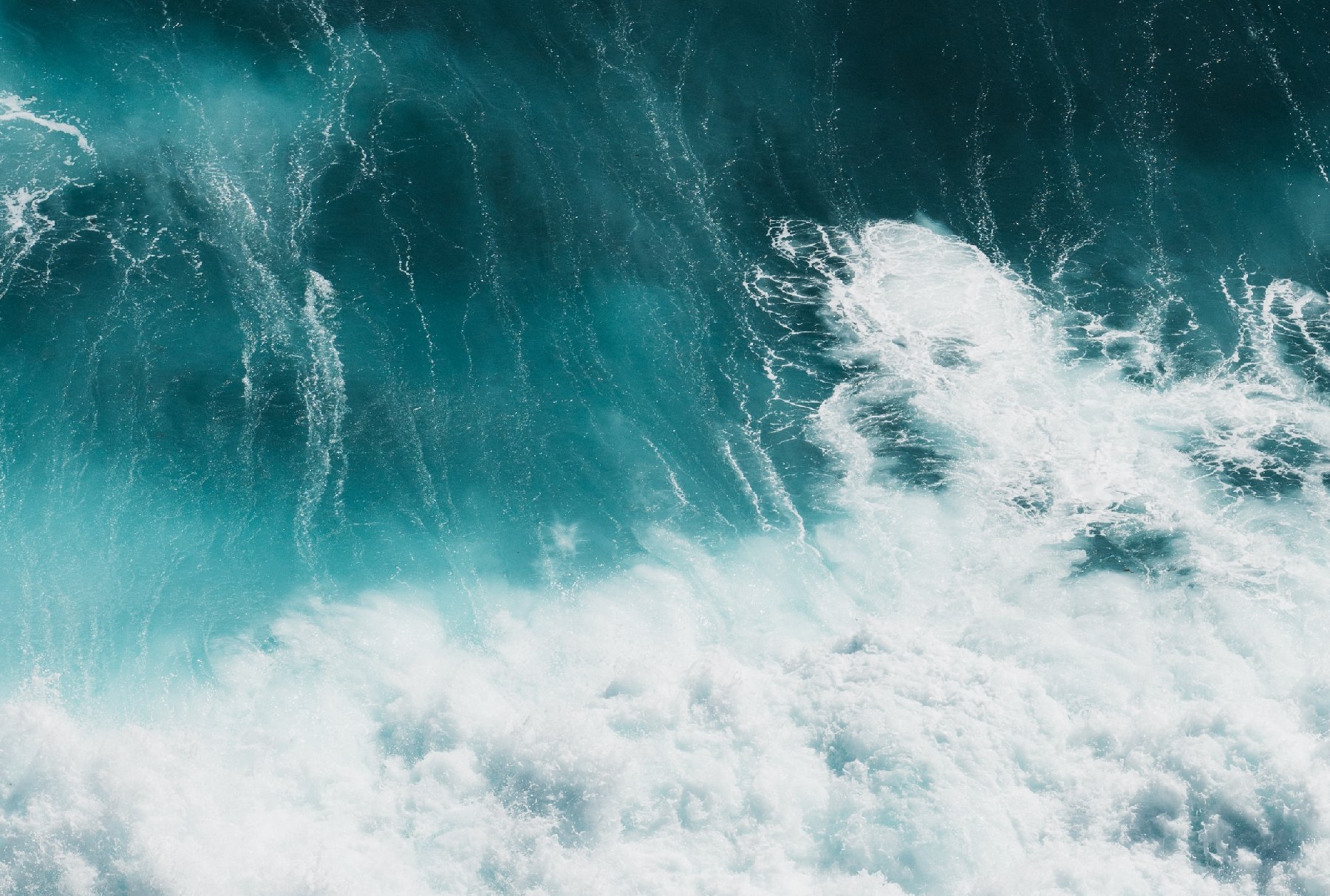Our Postgraduate Researchers
Dr Chloe Eastabrook, PhD
Supervisors: Dr Gary Caldwell, Dr Knut Erik Tollefsen, Dr Hans-Christian Teien, Dr You Song
Project title: Applying an integrated ecotoxicological approach to assess stress from exposure to trace metals and UVB radiation.
Coastal organisms are impacted by combinations of chemical and non-chemical stressors, including exposure to metals and elevated UVB radiation. The impacts of chemical mixtures upon these are largely unknown, as are the links between exposure and biological effects. Regulatory guidelines are often based on single effect data and concentration addition (CA) modelling that assumes an additive response, thereby overlooking possible synergistic or antagonistic interactions.
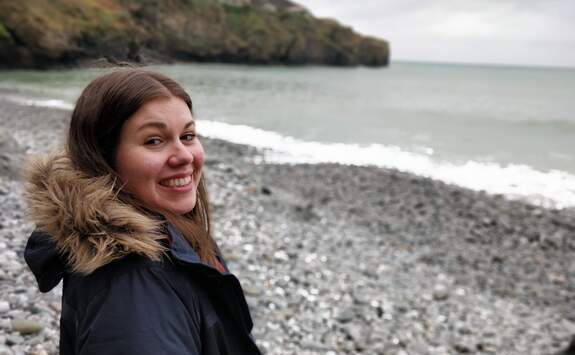
Using the copepod Tisbe battagliai and microalga Tetraselmis suecica, an integrated hazard assessment of single and combined metals provided a greater insight into how the interactions between metals influences mixture toxicity at different levels of biological organisation (molecular, cellular, and individual). Following stressor-specific toxicity pathways (DNA damage induced) allowed stressor-specific endpoints to be developed and conducted. For the combined studies, a form of resolution IV design (Definitive Screening Design, DSD) was implemented. CA and independent action (IA) models predicted combined responses for comparison to measured effects.
Contact information
Email: chloe.eastabrook@gmail.com
Twitter: @ChloeEastabrook
LinkedIn: https://www.linkedin.com/in/chloe-eastabrook-01650a13a/
Elizabeth Beauchamp, PhD
Supervisors: Prof. John Bythell, Dr James Guest, Dr Holly East
Project title: Choosing coral winners.
My main research interests are investigating physiological responses to anthropogenic climate change. The overarching goal of my PhD research is to inform assisted evolution interventions on coral reefs by determining the underlying causes of intra-population variation in heat tolerance. Through identifying physiological traits and using state-of-the-art proteomic analysis I aim to identify the function, mechanisms and symbiotic interactions which improve coral heat stress tolerance. If physiological or genetic traits that are associated with increased heat tolerance can be identified, these may be valuable in identifying the best candidate corals to be used for restoration and adaptation interventions.
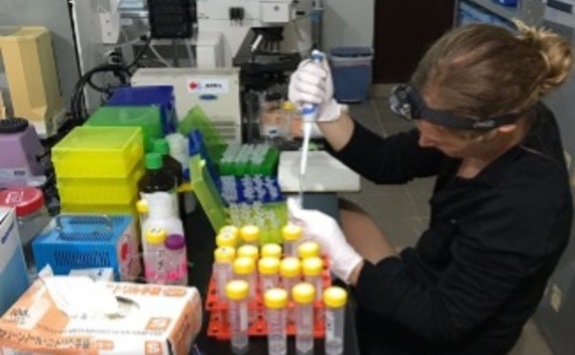
Contact information
Email: lizzy.beauchamp@gmail.com / e.beauchamp2@newcastle.ac.uk
Twitter: @Lizzy_Beauchamp
ResearchGate: www.researchgate.net/profile/Elizabeth-Beauchamp-2?ev=hdr_xprf
Research page: www.coralassistlab.org/elizabeth-beauchamp
Hannah Lloyd-Hartley, PhD and RA
Supervisors: Dr Jane Delany, Dr Ben Wigham and Dr Evelyn Jensen
Project title: Holistic approach in developing planktonic and benthic indicators.
Plankton are sensitive communities to anthropogenic and climatic changes and have only recently been considered indicators of these changes. Planktonic indicators require further development e.g., diversity. As many benthic organisms have a pelagic/planktonic life stage, the two communities are therefore linked. The connectivity of these communities has not been considered previously for indicators of changes and achieving/maintaining good environmental status. My first research aim is to understand the practicality and insight of genetic approaches to developing pelagic indicators alongside traditional methods. The diversity detail genetic metabarcoding can provide further understanding of community shifts, cryptic species and Non-native species.
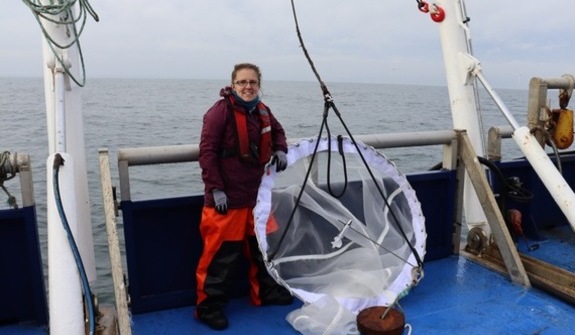
The second aim of my research is to investigate the plankton-benthic connectivity in the North Sea with the use of metabarcoding to access their feasibility as an indicator and the recruitment dynamics of commercially and ecologically important species e.g., Nephrops norvegicus. This includes investigating the abiotic and hydrodynamic influences within the Northumberland coast.
Contact information
Email: Hannah.lloyd-hartley@ncl.ac.uk
Twitter: @HannahLloydH
LinkedIn: https://uk.linkedin.com/in/hannah-lloyd-hartley-ba016873
Harry Catherall, PhD
Supervisors: Prof. Pip Moore and Dr Heather Sugden
Project title: Understanding the structure and function of kelp forests along industrialised coastlines and investigating how they can be restored.
My PhD research focuses on the structure, function and restoration of kelp forests along the coastlines of Durham, Northumberland, and Berwick. I will be comparing the structure and function of kelp forests along ‘pristine’ sections of the Northumberland and Berwick coastlines with those of the Durham coastline which have been historically impacted by coal mining spoil and are recovering from these impacts. I will be investigating how heavy metals from coal mining operations have impacted kelp forest growth and productivity, and the influence on their microbiome. In areas where kelp forests have not been able to re-establish I will be investigating approaches to give nature a helping hand to restore these important ecosystems.
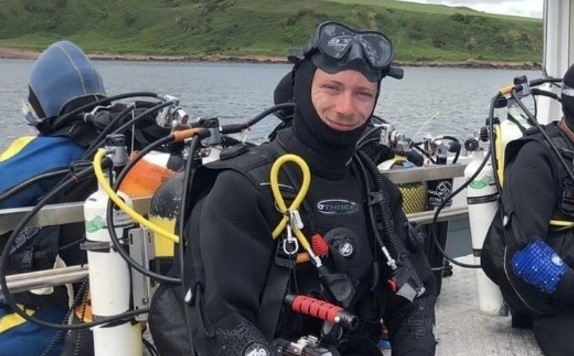
Contact information
Email: H.Catherall2@newcastle.ac.uk / Hc43@hotmail.co.uk
Twitter: @HJNCatherall
Research group: https://mooremarineecologylab.com/people/
Jess Clarke, PhD
Supervisors: Prof. Tony Clare, Dr Jem Stach, Dr Nick Aldred, Dr Andrew Nelson, Dr Tom Vance
Project title: Biofouling invertebrates and their larvae as vectors of antimicrobial resistance (AMR) and marine pathogens.
Traditionally anti-fouling technology is based upon the use of biocides in paints to prevent colonization, or to kill through toxicity, of potential settlers. Consequently, only species that are ‘resistant’ are able to thrive on these surfaces. There is evidence that heavy metals and biocides in these paints select for resistant species and bacteria within the biofilms that form, while also co-selecting those that demonstrate Antibiotic Resistance, cumulatively forming the ‘resist-ome’. Fouling communities may therefore pose as a reservoir of anti-microbial resistance (AMR) and pathogenic bacteria & viruses (e.g. Vibrio parahaemolyticus and Pseudomonas putrefaciens) within the marine environment.
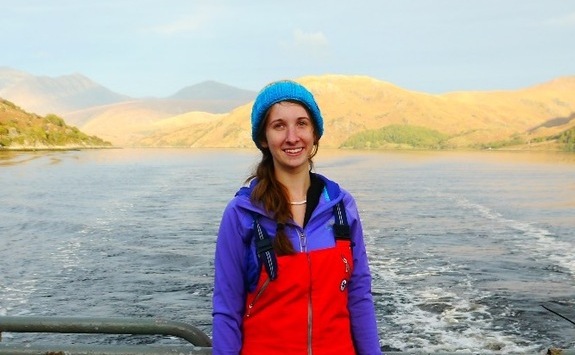
AMR is recognised by the World Health Organization (WHO) as one of the most important global issues facing human and animal health. Climate change and other anthropogenic influences exacerbate the increased presence of AMR in the marine environment. Due to the heavy use of anti-foulants on ships that travel between different ecological regions, the risk of spread of potential AMR (and associated resist-ome) and pathogenic species is therefore of high concern and interest.
Contact information
Email: j.clarke14@ncl.ac.uk
LinkedIn: www.linkedin.com/in/jess-clarke-0697146a/
ResearchGate: www.researchgate.net/profile/Jessica-Clarke-9
Liam Lachs, PhD
Supervisors: Dr James Guest, Prof. John Bythell, Dr Holly East, Prof. Peter Mumby
Project title: Corals and climate change - understanding coral heat tolerance across ecological scales.
Tropical coral reefs support a remarkable level of biodiversity and crucial ecosystem services to millions of people worldwide. Yet, coral reefs are the first entire ecosystem at risk of being lost due to climate change, having faced unprecedented declines due to mass coral bleaching and marine heatwaves. My PhD research is focussed on understanding coral heat tolerance, from individual and population scales to entire assemblages and global ecosystem patterns.
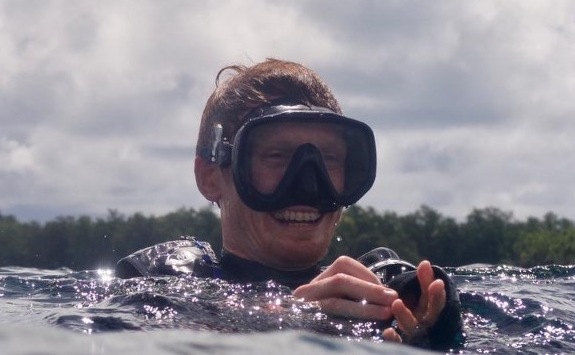
Particularly, my work has focussed on improving coral bleaching predictions, understanding the capacity for adaptation, and contextualising what adaptation may mean for future reef trajectories. Ultimately, climate-smart local management solutions are needed alongside globally concerted efforts to move to a low carbon future.
Contact information
Email: l.lachs2@newcastle.ac.uk
Twitter: @LiamLachs
LinkedIn: www.linkedin.com/in/liam-lachs-260422a9
Research group: https://www.coralassistlab.com/liam-lachs
Melissa Versteeg, PhD
Supervisors: Dr Theresa Rueger and Dr Isabel Smallegange
Project title: Understanding the long-term effects of abiotic and biotic stressors on the population dynamics and reproduction of anemonefishes.
Certain coral reef fishes form an obligate mutualism with their host territory, meaning that both fishes and host do not survive without the mutual relationship. Though beneficial, this association also renders both parties more exposed to negative environmental impacts, as they remain in close contact throughout incidents of environmental stress. Given the expectancy of increased environmental stress on coral reefs in the future due to climate change, focussing on coral reef fishes and environmental stress exposure is necessary to identify aspects of resilience and vulnerability.
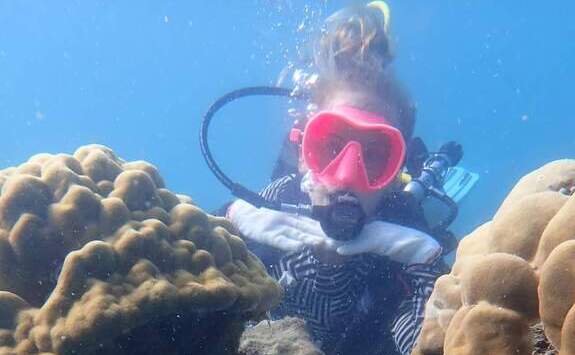
My research uses small-scale monitoring of anemonefishes as a tractable model to examine coral reef fishes with high site dependence. Along inshore reefs in Kimbe Bay, Papua New Guinea, I will monitor (a)biotic stressors such as predator density, temperature, and turbidity, to study their spatial and temporal impacts on anemonefishes.
Contact information
Email: m.versteeg2@newcastle.ac.uk
LinkedIn: www.linkedin.com/in/melissa-versteeg-92bb2490/
Research group: www.drtrueger.com/team
Sakinah Hussain Alhaddad, PhD
Supervisors: Prof. Tony Clare and Dr Gary Caldwell
Project title: The effect of environmental and pollution aspects on Halichondria panicea sponge microbiome.
The breadcrumb sponge, Halichondria panicea, is a cosmopolitan marine species. It is tolerant of temperature, pH and salinity fluctuations, and life functions such as feeding, metabolism and defence are maintained through microbial symbiosis. Identifying the bacterial species responsible for these functions is necessary for a deeper understanding of sponge bacterial community structure and underlying co-evolutionary processes. My research aims to study the effect of different environmental factors and pollution on the microbial community of the Halichondria panicea sponge. This was achieved by collecting sponge samples from three sites, each with a different bathing water quality ranging from excellent to poor, according to the UK Environment Agency.
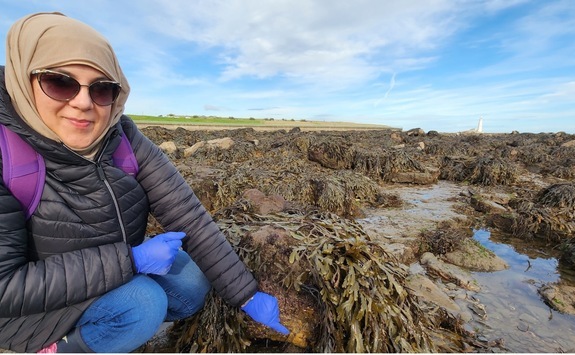
My second goal is to study the effects of antifouling paints on sponge survival and its microbiome composition and diversity.
Contact information
Email:s.h.j.k.j.alhaddad2@newcastle.ac.uk / Sakinah.h.alhaddad@gmail.com
ResearchGate: www.researchgate.net/profile/Sakinah-Alhaddad
